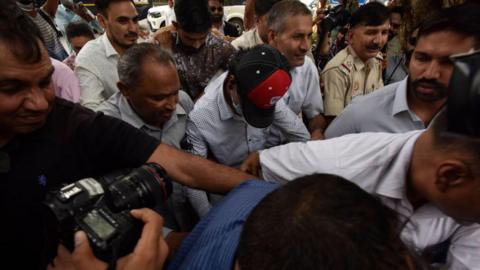The government had faced similar criticism in 2022 when Zubair was arrested and spent more than three weeks in jail before the Supreme Court freed him on bail.
Delhi police had arrested him over a 2018 tweet which was a screengrab from a popular 1980s Bollywood film, but they accused him of "insulting Hindu religious beliefs". Later, police in Uttar Pradesh also registered cases against him, accusing him of other misdemeanours including criminal conspiracy and receiving foreign funds.
BJP spokesperson Gaurav Bhatia had accused him of being “selective and politically biased” in his fact-checking and said his tweets “hurt the religious sentiments of a large number of Hindus”.
But many at the time linked his arrest to the controversial Islamophobic comments made by BJP spokesperson Nupur Sharma. The Hindu newspaper said Zubair was “being made to pay for a tweet that had drawn wide attention to Sharma’s vile remarks” against Prophet Mohammad and described it as an instance of the government's "intolerance towards fact-checkers who frequently expose its claims".
International rights groups and the United Nations had also expressed concern, with a spokesperson for the UN chief Antonio Guterres saying that "journalists should not be jailed for what they write, tweet, and say".
But critics say that’s exactly what the authorities are using to pick on Zubair and other journalists.
India has been consistently sliding on the Global Press Freedom rankings - it is now placed at 159 out of 180 countries - according to media watchdog Reporters Without Borders (RSF).
“Journalists critical of the government are routinely subjected to online harassment, intimidation, threats and physical attacks, as well as criminal prosecutions and arbitrary arrests,” the annual RSF report said.
In the past, the Indian government has rejected the report, saying its methodology was “questionable and non-transparent”.
